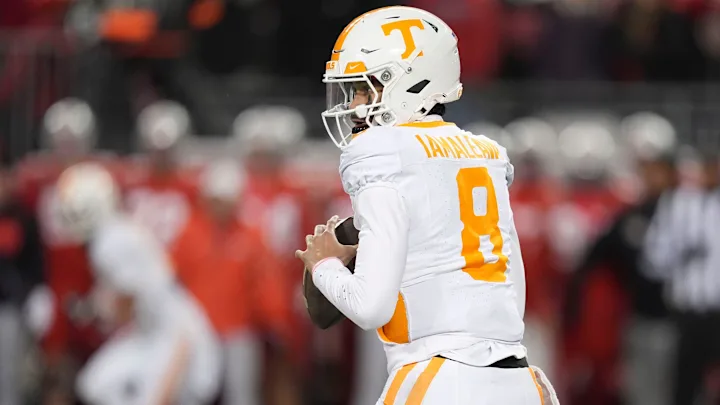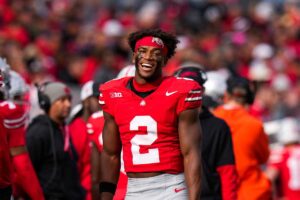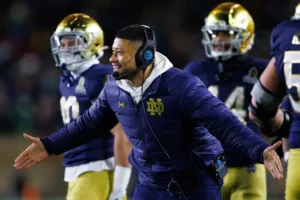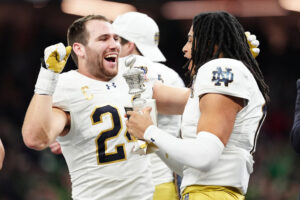
In recent years, NIL (Name, Image, and Likeness) has become a key topic of discussion in college football, altering the landscape of recruiting, player compensation, and the way athletes approach their college careers. The ability for student-athletes to earn money through their NIL has revolutionized college sports, with players now able to sign endorsement deals, profit from their social media presence, and use their platform to promote brands and businesses. However, despite the opportunities presented by NIL, the system is still evolving, and controversy has arisen surrounding the fairness and the execution of NIL opportunities, particularly when it comes to large programs in college football.
One of the most recent and notable developments occurred with the University of Tennessee Volunteers football team, where players threatened to sit out of their College Football Playoff (CFP) game due to disputes over their NIL deals. This incident, which stunned college football fans and media, brought into sharp focus the growing divide between athletes, schools, and the expectations surrounding NIL rights. The controversy centered around the perceived inequities in how players were compensated, the lack of transparency in NIL deals, and the desire of players to capitalize on their college careers in ways that best supported their financial futures.
This article will explore the incident where Tennessee football players threatened to sit out of the CFP game over NIL issues, the broader implications for college football, and how the evolving NIL landscape could continue to shape the sport in the years to come. From the specifics of the dispute to the future of NIL in college sports, this story provides a glimpse into the challenges and changes facing student-athletes in modern college football.
Background: The Rise of NIL in College Football
Before delving into the specifics of the Tennessee situation, it’s essential to understand the broader context of NIL in college sports. In 2021, the NCAA finally enacted changes to its rules regarding NIL, allowing athletes to profit off their personal brand. This was a monumental shift, as previously, college athletes were prohibited from receiving any form of compensation beyond scholarships, with the organization facing increasing pressure from lawmakers and athletes advocating for their right to benefit financially from their fame and efforts.
The introduction of NIL rights has had profound effects on college sports. It has enabled athletes to sign endorsement deals, promote products on social media, receive compensation for autographs, and even create their own merchandise. While NIL has been a game-changer for athletes who previously lacked avenues for monetization, it has also created complexities for universities and athletic programs that now find themselves navigating this new era of player compensation.
NIL opportunities have been disproportionately concentrated at programs with larger fanbases and more national visibility, such as Alabama, Ohio State, Texas, and Tennessee. These schools, often among the biggest and wealthiest in college football, have attracted top recruits with the promise of lucrative NIL deals, with boosters, third-party companies, and brands eager to capitalize on the popularity of these athletes.
However, the advent of NIL has not been without controversy. The lack of standardization across schools and the murky nature of some deals have led to confusion, frustration, and even resentment among athletes. Disparities in NIL compensation between players, unclear expectations for NIL deals, and allegations of schools offering excessive NIL promises to recruits have sparked debates about the fairness of the system and whether it has created a “pay-for-play” environment that undermines the integrity of college sports.
The Incident: Tennessee Players Threaten to Sit Out
Amidst this evolving NIL landscape, the Tennessee Volunteers football team found itself embroiled in a high-profile controversy ahead of a crucial College Football Playoff game. As the Volunteers prepared to face off in a high-stakes game, several key players reportedly threatened to sit out of the game over dissatisfaction with their NIL deals. These players, some of the most prominent and high-profile figures on the team, voiced concerns about their compensation in comparison to other players within their program and around the country.
Reports indicated that Tennessee football players felt that their NIL opportunities were not being handled equitably. While some players were able to secure lucrative deals with local businesses, others felt that they were not receiving fair compensation for their roles on the team, especially considering the attention they had brought to the program during the regular season. Players felt that the University of Tennessee, along with third-party entities that handled NIL deals, had failed to sufficiently support them and had not delivered on promises made during recruiting. The perceived lack of transparency in the distribution of NIL deals was also a key point of contention.
At the heart of the issue was the disparity between top players who had lucrative NIL deals and others who felt that their marketability or performance had not been adequately recognized. The situation reached a boiling point when a group of star players—some of whom were expected to play pivotal roles in the CFP game—voiced their frustration. Faced with the prospect of one of their biggest games in program history, these players threatened to sit out unless their NIL concerns were addressed.
The potential impact of this threat was significant, both for the Tennessee football program and for college football as a whole. For a team with championship aspirations, losing key players at such a critical juncture would have been devastating. Additionally, the situation raised serious questions about the role of NIL in the sport and whether players were now in a position to hold programs hostage over financial disputes.
The Response: Tennessee Administration and NCAA Involvement
The University of Tennessee and its athletic department were put in an incredibly difficult position. Athletic director Danny White and head coach Josh Heupel were forced to navigate the complexities of the NIL landscape, trying to balance the demands of their players with the logistical and financial realities of college sports.
In an attempt to resolve the situation, Tennessee officials held meetings with the players to address their concerns. The conversations focused on providing clarity around the NIL deals, establishing more equitable opportunities for players who felt they had been left behind, and negotiating better terms for the players involved. However, the situation also raised questions about the role of the NCAA in regulating NIL deals and ensuring that schools were not making promises they could not keep. The NCAA, which had previously been reluctant to implement comprehensive oversight on NIL compensation, was now facing pressure to step in and provide clearer guidelines.
On the other hand, several players who had been vocal about their dissatisfaction with NIL deals expressed that their primary concern was fairness. They felt that their contributions to the team were not being properly valued, especially in comparison to the growing amounts of money pouring into college football programs. While the threat to sit out the CFP game was significant, many of the players involved stated that their goal was not to create chaos but rather to demand better treatment for all college athletes in the age of NIL.
Despite the tense nature of the situation, the university and the players were able to come to a resolution, with an agreement to address many of the players’ concerns. Tennessee also announced that it would be working more closely with NIL companies to ensure greater equity for athletes moving forward.
The Broader Implications of the Situation
The incident involving Tennessee football players threatened to sit out due to NIL disputes is reflective of broader issues facing college football today. As NIL continues to evolve, so too do the challenges and conflicts associated with it. The Tennessee situation sheds light on several key areas of concern for college athletes, schools, and the NCAA.
1. Disparities in NIL Compensation
One of the most significant issues highlighted by this situation is the disparity in NIL compensation. While some players at top programs may secure lucrative deals with big-name brands and local businesses, others are left to fend for themselves in a crowded market. These disparities can create division within teams, with players feeling that their contributions are not being rewarded fairly. As NIL deals become an increasingly important factor in recruiting, schools will need to find ways to ensure more equitable distribution of resources.
2. The Growing Power of Players
The Tennessee football players’ threat to sit out their CFP game illustrates the growing power that athletes now hold in the world of college football. With NIL deals providing players with significant financial leverage, athletes are now in a position to demand more from their schools, coaches, and athletic departments. The ability of college players to influence the outcome of major games, including playoff appearances, underscores the dramatic shift in power dynamics in college sports.
3. The Role of the NCAA and NIL Regulation
The incident also raises questions about the role of the NCAA in regulating NIL deals and ensuring that they are handled in a transparent and fair manner. As the NIL landscape continues to expand, the NCAA will likely face increasing pressure to step in and provide greater oversight to ensure that athletes’ interests are protected, and that schools are not making unrealistic promises. Without proper regulation, the NIL system risks becoming an uneven playing field where only the most marketable athletes benefit.
Looking Forward: The Future of NIL in College Football
The situation involving Tennessee football players and their NIL disputes is just one example of the growing pains that college sports will face in the NIL era. While the system has opened up new opportunities for athletes, it has also created challenges that must be addressed to ensure fairness and transparency. College football programs, including Tennessee, will need to adapt to this new reality and find ways to navigate the complexities of NIL deals while maintaining the integrity of the sport.
For Tennessee and other college football programs, the key moving forward will be striking a balance between supporting their athletes’ financial opportunities and maintaining a cohesive team dynamic. As NIL continues to evolve, the landscape of college football will change dramatically, and the players themselves will have a much larger say in their futures. The question now is how the NCAA, schools, and players will navigate this new era of college football to ensure that everyone benefits from the opportunities presented by NIL.





